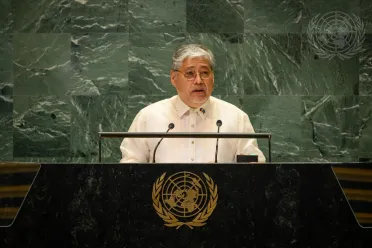Statement
Statement summary
ENRIQUE A. MANALO, Secretary for Foreign Affairs of Philippines, describing the UN as “the ground for States to find convergence amidst crises and conflict”, said the Organization must rise to the occasion. For that, the reform of the Security Council and General Assembly is needed, including the enlargement of the Council’s membership and improvement of its working methods. He also emphasized the need for transforming the international financial architecture to achieve just and inclusive growth and to ensure that governance of new spheres of human activity, including artificial intelligence (AI), “places human dignity as the priority”. The rising numbers of those forcibly displaced — in Ukraine, Gaza and other places —- beg for a deeper sense of collective responsibility, he emphasized, highlighting his country’s support for humanitarian emergencies through UNRWA and other bodies.
He detailed his country’s long history of contributing to UN peacekeeping operations since 1963, including the deployment over 14,000 troops in 21 UN peacekeeping and special political missions. On that matter, he called for bolstering the UN Peacebuilding Fund and supporting Security Council resolutions. Pointing to his country’s acute climate vulnerability, he also described it as one of the “staunchest proponents for strengthening climate and disaster risk resilience”. Against this backdrop, he called on developed nations to fulfil their commitments under the United Nations Framework Convention on Climate Change (UNFCCC) and the Paris Agreement on climate change.
Turning to the issue of sustainable development, he spotlighted his country’s progress in reducing poverty by nearly 3 per cent between 2021 and 2023. As the Philippines moves towards upper-middle-income status, he urged international financial institutions to redesign frameworks to better support middle-income countries, which represent 75 per cent of the global population. “If multilateralism is to thrive, all States must adhere to the rule of law,” he said, stressing that his country will continue to assert its sovereignty in the South China Sea through peaceful means. Therefore, he rejected the narrative of depicting the South China Sea as a theatre of major Power rivalry. “The future of the Asia Pacific is being shaped not by one or two Powers, but by all States therein,” he emphasized.
Full statement
Read the full statement, in PDF format.
Photo

Previous sessions
Access the statements from previous sessions.
